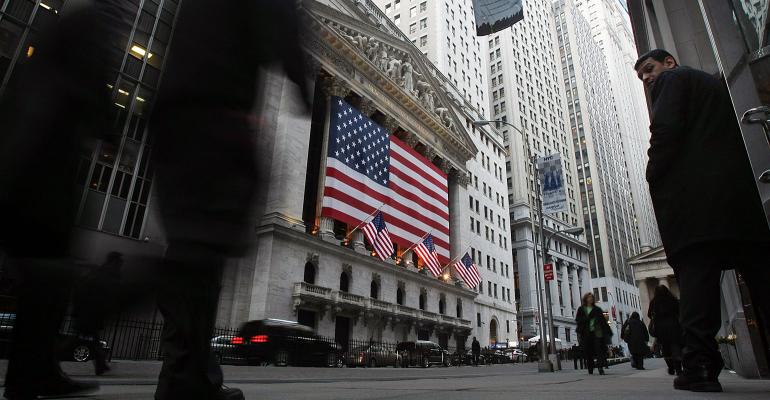By Rachel Evans and Sally Bakewell
(Bloomberg) --Wall Street bankers racing to comply with a new rule designed to prevent another crisis are hoping Donald Trump’s victory will bring them a reprieve.
The U.S. President-elect aims to “dismantle” the 2010 Dodd-Frank financial reform act, according to a statement on his transition team’s website. That could include easing a regulation that forces issuers of debt backed by commercial mortgages, loans, and other assets to keep some of the bonds they are selling, Darrell Wheeler, head of structured finance research at S&P Global Ratings, wrote in a note to clients this week.
That rule could increase financing costs for office buildings, hotels, and other properties -- a good motivation for real estate magnate Trump to revamp it, said Matthew Anderson, a managing director at data provider Trepp LLC. Wall Street has spent the last six years kicking against the risk retention rule, which takes effect Dec. 24. Sales of commercial mortgage-backed securities slumped almost 50 percent in the first half of the year as bankers grappled with how to comply with it.
“A Trump administration will be very interested in a lightening of the regulatory burden for all sorts of industries, banking of course being one of them,” Anderson said. But it is not clear how high on his priority list this rule will be, he added.
Paul Atkins, a former commissioner of the Securities and Exchange Commission and a critic of Dodd-Frank, was asked to help pick new leadership for financial regulators, said a person with direct knowledge of the matter. Republicans who will continue to control both chambers of Congress are also interested in overturning the law.
During Atkins’s SEC tenure, he was an outspoken critic of regulations that forced hedge funds to register with the agency and a requirement that mutual fund boards be led by independent chairmen. He also voiced frequent opposition to imposing large fines on corporations, arguing that such sanctions disproportionately hurt shareholders rather than wrongdoers.
“Dodd-Frank has failed and it has failed miserably,” said House Financial Services Committee Chairman Jeb Hensarling in an interview with Bloomberg Television in June. “It has to be replaced.”
Repeal Blueprint
Hensarling proposed legislation this year that may provide a framework for any rolling back of Dodd-Frank, according to Brian Olasov, who chairs the policy committee for trade group the Commercial Real Estate Finance Council. The so-called Financial Choice Act would repeal risk retention for securities backed by assets other than home loans, among other rules.
Trump has “a general sympathy for the ability to extend credit,” said Olasov, who is also an executive director at Carlton Fields Jorden Burt. He was speaking in a personal capacity and not for CREFC or Carlton Fields, he said. “The earth has shifted and we’re still trying to figure out where our footing is. And it’s going to be months before it’s sorted out.”
The risk retention rule was designed to prevent banks and other lenders from making bad loans, packaging them into bonds, and letting investors eat the losses when the securities sour. It comes after bad subprime mortgages were packaged into bonds and helped inflate a housing bubble last decade.
CLO Respite
Nixing rules on risk retention could also benefit the market for collateralized loan obligations and leveraged loans, which have both shrunk in anticipation of the regulation. Issuers of CLOs have been rushing to refinance existing transactions before the new rules take effect.
“The loan market would benefit because that would allow a greater freedom of issuance of CLOs,” said Steven Oh, managing director at PineBridge Investments LLC, with $82.6 billion of assets under management. “More managers would be able to access the CLO market which would increase the demand flow for loans.”
It is too early to evaluate the direct impact of Trump’s victory on the CLO and loan markets, said the Loan Syndications and Trading Association in an e-mailed response to questions. The organization -- whose members include the 10 biggest CLO managers and top arrangers -- plans to continue its legislative efforts to tweak the rules, and has sued regulators to overturn the rule.
While Trepp’s Anderson says there may be some effort to roll back Dodd-Frank within Trump’s first 100 days in office, it doesn’t seem to be a top priority. Toby Cobb, managing partner of Grass River Property, a real-estate finance company based in Coconut Grove, Florida, agrees.
“A repeal of Dodd-Frank is low on Trump’s priority list,” said Cobb.“The voter that came out overwhelmingly in support of Donald Trump is no friend to the financial services industry.”
--With assistance from Matt Scully and Jennifer Jacobs. To contact the reporters on this story: Rachel Evans in New York at [email protected] ;Sally Bakewell in London at [email protected] To contact the editors responsible for this story: Nabila Ahmed at [email protected] Dan Wilchins, Faris Khan





